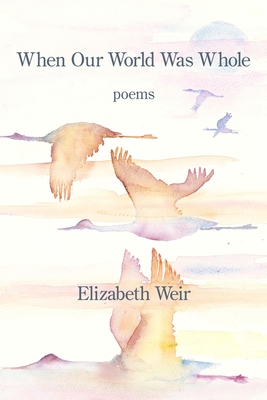When Our World Was Whole

When Our World Was Whole
As the title suggests, wholeness-and a search for wholeness-informs Elizabeth Weir's perceptive poetry. Her explorations open with the well of childhood in a time of scarcity: meals of mashed parsnips and a sense of "the weight of limited possibility"- worries offset by the comforts of home. Weir resists limits, as she starts a career, emigrates, travels and responds to the pressures of the pandemic and George Floyd's murder. Throughout, Weir stays attuned to the most enduring source of wholeness, the sustaining mystery of the natural world: "so much we miss, so little we know." When Our World Was Whole is a wise, thoughtfully orchestrated book, alert to both the local and the large.
-James Silas Rogers, poet, The Collector of Shadows
The geography of Elizabeth Weir's second collection, When the World Was Whole, ranges from a Starbucks to the Island of Hydra and from a window overlooking woods to Namibia's Namaqua daisies. A master of the line and mot juste, Weir describes displays of possession-man over woman, hawk over snake, silence over woods. Never far from Weir's heart are concerns for the "the keepers of the wild." In "I Cherish All of You," Weir sees a child as a plagiarism of previous generations. I loved, too, her poems' fragile interiors: "...to the vase of weary tulips/ in his room of sighs, to his breath/ that labors, let nighttime fall."
-Sharon Chmielarz, poet, Speaking in Riddles and other books
The pleasure of Elizabeth Weir's poetry is similar to spending time with a trusted and delightful companion who shares experiences and reflections in a wise and graceful way. I felt a "deepness between us." Brought up in England, her writing has richness from a childhood of cricket, thin post-war years, mums and chums. A bright wit lights poems such as "Major Service" with its metaphor of surgery, akin to body shop repair. Other poems remind us how fragile the Earth's future is, given that humans "speed, blind with haste, our habit to search and consume...." But, like Wendell Berry, Weir praises wild things with a keen eye for the natural world. I'm awed and grateful for these poems' gifts.
-Margaret Hasse, poet, Summoned and other books
PRP: 155.00 Lei
Acesta este Prețul Recomandat de Producător. Prețul de vânzare al produsului este afișat mai jos.
139.50Lei
139.50Lei
155.00 LeiIndisponibil
Descrierea produsului
As the title suggests, wholeness-and a search for wholeness-informs Elizabeth Weir's perceptive poetry. Her explorations open with the well of childhood in a time of scarcity: meals of mashed parsnips and a sense of "the weight of limited possibility"- worries offset by the comforts of home. Weir resists limits, as she starts a career, emigrates, travels and responds to the pressures of the pandemic and George Floyd's murder. Throughout, Weir stays attuned to the most enduring source of wholeness, the sustaining mystery of the natural world: "so much we miss, so little we know." When Our World Was Whole is a wise, thoughtfully orchestrated book, alert to both the local and the large.
-James Silas Rogers, poet, The Collector of Shadows
The geography of Elizabeth Weir's second collection, When the World Was Whole, ranges from a Starbucks to the Island of Hydra and from a window overlooking woods to Namibia's Namaqua daisies. A master of the line and mot juste, Weir describes displays of possession-man over woman, hawk over snake, silence over woods. Never far from Weir's heart are concerns for the "the keepers of the wild." In "I Cherish All of You," Weir sees a child as a plagiarism of previous generations. I loved, too, her poems' fragile interiors: "...to the vase of weary tulips/ in his room of sighs, to his breath/ that labors, let nighttime fall."
-Sharon Chmielarz, poet, Speaking in Riddles and other books
The pleasure of Elizabeth Weir's poetry is similar to spending time with a trusted and delightful companion who shares experiences and reflections in a wise and graceful way. I felt a "deepness between us." Brought up in England, her writing has richness from a childhood of cricket, thin post-war years, mums and chums. A bright wit lights poems such as "Major Service" with its metaphor of surgery, akin to body shop repair. Other poems remind us how fragile the Earth's future is, given that humans "speed, blind with haste, our habit to search and consume...." But, like Wendell Berry, Weir praises wild things with a keen eye for the natural world. I'm awed and grateful for these poems' gifts.
-Margaret Hasse, poet, Summoned and other books
Detaliile produsului










